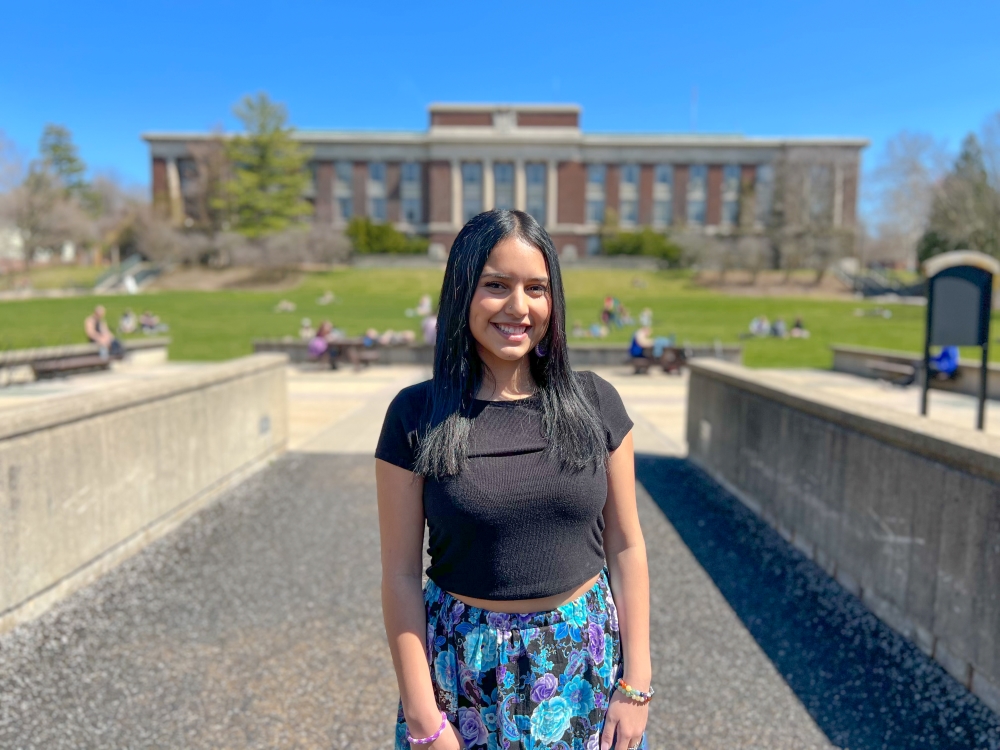Recent Headlines
- Meet the Faculty - Andrea Parker
- ESF President Joanie Mahoney Announces Applications Are Open for the College’s New, Pre-college Summer Engineering Program for High School Juniors, Seniors
- ESF Chemistry Students Present Research at International Conference
- ESF Announces Academic Honors Lists for Fall 2025 Semester

Makiyah Lazore
Mighty Oak Monday: Makiyah Lazore
Major: Environmental Studies
Concentration: Environment, Communication, and Society
Hometown: Onondaga Nation
Class of ’26
Makiyah Lazore remembers the two summers she spent at the Center for Native Peoples
and the Environment (CNPE)’s Native Earth Environmental Youth Program at ESF. The
hands-on ecological lessons were taught by respected Indigenous elders and set against
the picturesque backdrop of the Newcomb Campus in the Adirondacks.
Lazore learned about Traditional Ecological Knowledge and was encouraged to find her own relationship with the environment. She learned about Indigenous land care practices of the Adirondacks and practiced subsistence activities. She immersed herself in nature through traditional skills-based workshops such as fire-making, medicinal plant identification and medicine making, cattail cordage, traditional basket making, and more. With each passing moment, she found the link between her culture and history deepening.
The interactions between Indigenous and western science inspired Lazore to think critically about how the climate crisis impacts her community. The annual cycle of ceremonies stood out in her mind. Celebrations are tied to cycles of the seasons, but as a changing climate blends the seasons, it makes marking important events harder. Some crops that once flourished on Onondaga Nation are difficult to grow with mid-May frosts and December heat snaps impacting the lives of the plants.
When Native Earth participants were invited to speak at the United Nations’ Climate Action Summit, Lazore chose to center her speech around this issue. The passionate advocacy and protests cemented her resolve – Lazore was ready to join the climate fight and knew ESF would be the best place for continuing her journey.
She enrolled as an Environmental Studies (ES) major in fall 2022 and resolved to become an educator, advocate, and storyteller. Lazore found inspiration in the film screenings offered by the Center for Native Peoples and the Environment, the organizers of Native Earth, and decided to create documentary films focused on Indigenous environmental science as part of her coursework.
Lazore has plans to help strengthen the Indigenous community at ESF. She intends to
start a Native American Club on campus to create a space for Indigenous people to
feel supported and spread awareness of Indigenous cultures. The club will host medicinal
plant walks, guest speakers from Onondaga Nation, film screenings, volunteer opportunities,
and occasions to make traditional Native food.
Having completed her first year at ESF, Lazore already feels her experience is coming
full circle. As part of her work with the CNPE this field season, Lazore will be helping
coordinate Native Earth this summer.
“I want to create action now in our communities and pass on that passion for action to future generations,” Lazore said.
Indigenous high school students in grades nine-11 interested in the Native Earth Environmental Youth Program can learn more on our website or by contacting Tusha Yakovleva at [email protected].